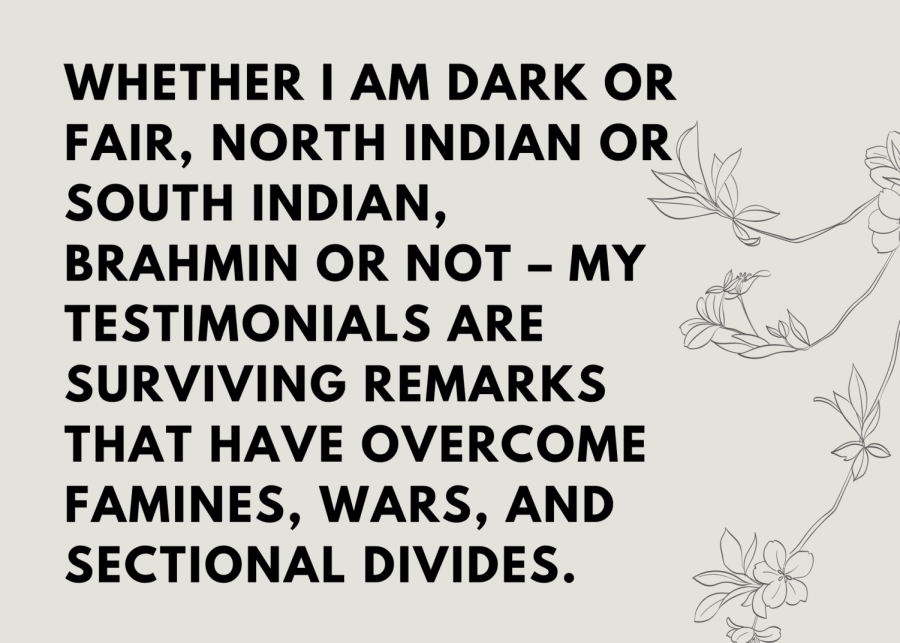My existence is resistance
May 23, 2023
Hi.
My name is Rachna.
1 word, 3 syllables, and nothing more.
“Kanna, don’t go in the sun; you will darken,” said Ammamma.
In what was meant as a gesture of protection from the Indian diaspora, my Ammamma looked at me with her watchful eyes, daring me not to disobey her suggestion.
How could my Ammamma, with her rose-water scent, fair skin, and kind soul, say that to me? I was eight.
What came in snippets of awkward suggestions posed by a sweet old lady was a mechanism to protect me from the existing divide between the Indian diaspora. One that is concealed under the false words of the family; “beta, aunty, uncle, kanna” – which is nothing but a coverup of the underlying issues of colorism, casteism, and bias.
I grew up in an uncharacteristic Indian household – my father, a strict man, always pushed me to be the best – my mother, an unconventional woman of her time. Both individuals sacrificed their souls to give me a life they never had. So, when I found myself surrounded by the people of Motswana, I was happy – I connected with them, far from the issues the Indian population experienced. I was one of the few Asian people in my school; at that point in time, I had a certain cultural connection to India – I was better than that. I had escaped the poverty, the biases, the awkward conversations with the aunties, and the languages: Tamil and Kannada. I was six.
So, when I moved to England with my mother and my father stayed behind, I was quite literally thrust into an abyss where I was the only one standing. It was in England where the color of my skin mattered; my African accent protruded against the smoothness of the colonial tongue – where questions like “Do you speak English” were a common phenomenon. Yet, even my own people were divided by regional differences stemming from India. North Indians never associated with South Indians, and Brahmins neglected the other castes; yet, the mix of Modern India with Western ideals shaped the idea of “Indianness.”
I define “Indianness” as the symbiosis of the Indian diaspora, where the South Asian people co-exist with perfect unity, healed from the generational trauma perpetuated by colonial ideology.
So, culture is defined by “Indianness” – the perfect harmonic tunes weaved into one another, where North and South can exist so that one day the Carnatic rhythms of Bharatanatyam live in amity with the Kathak tablas.
Until then, no, I am not cultured. How can I be when so many regional differences exist? Shouldn’t the Indian diaspora be one? Celebrating the victories of all Indians? Until this symbiosis occurs between the Indian population across all facets – religion, color, and caste – no “culture” exists. Because what is the point when our own people are instigators of trauma?
Regardless of whether my Ammamma meant to protect me from the hard-hitting reality of colorism, I know that history designed her to use coloristic mechanisms in Modern India.
Whether I am dark or fair, North Indian or South Indian, Brahmin or not – my testimonials are surviving remarks that have overcome famines, wars, and sectional divides.
My existence is resistance.
